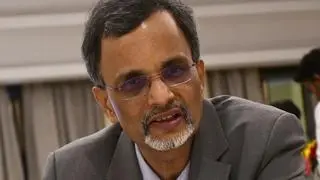India should aim for 8 per cent annual GDP growth on a sustained basis between now and 2050, former US Treasury Secretary Lawrence Summers suggested on Saturday.
This growth aspiration can be an “imaginable goal” for the country given its growth potential and such a target can bring transformative changes to millions of people as India defines its greatness in this next century, Summers said in his lecture on ‘The World is on Fire’ in the capital.
The lecture was organised by the Confederation of Indian Industry (CII) in partnership with the Department of Economic Affairs (DEA) in the Finance Ministry.
Measures
A combination of steps — freeing market forces; addressing infrastructure needs particularly in energy; addressing the federal issues and reforms in key States and supporting more effective public sector could generate this growth, Summers added.
Summers however made it clear that the 8 per cent a year growth was not his forecast based on current policy, but felt that it was an “imaginable goal” given India’s potential even in a more challenging world economy.
The renowned economist noted that India’s economic performance also depends very importantly on what happens in the global economy. “But there is a possibility that Artificial Intelligence (AI)—an area India wants to find ways to excel — may be a bit of an accelerator to global growth in the years ahead”, he added.
India’s gross domestic product (GDP) grew 7.2 per cent in 2022-23 as against growth level of 9.1 per cent. For the current fiscal, the Reserve Bank of India (RBI) has projected a GDP growth of 6.5 per cent.
‘Higher for longer’
Asked to comment on the consequences of ‘higher for longer’ interest rate regime across the world, Summers noted that ‘higher for longer’ is reflection of economic strength. “If interest rates are higher for longer, it will be because the economy is able to have stronger underlying growth. Stronger underlying growth in the US also has benefits in terms of pulling in exports and supporting growth”, he said. “I would be surprised if higher for longer proved to be a major barrier to growth and I don’t expect this to take place”.
Summers said that protectionism is a very real ground for substantial concern. “The important thing to understand about resilience is that it comes much more from diversity than it comes from self-reliance”, he added.
MDB
In his lecture, Summers dwelt on the reforms needed in the functioning of the multilateral development banks (MDBs) and underscored the need for them to treble their lending flows.
Summers is the co-convenor of the G20 Independent Expert Group on Strengthening MDBs. The IEG has delivered volume 1 of their report which was acknowledged by G20 Leaders in the New Delhi declaration.
Summers on Saturday said that MDBs should take on as a central part of their work the mission of sustainability, specifically, and of global public good, more generally. “We will not succeed in reducing global poverty, continuing the kind of global growth, continuing the kind of human prosperity without addressing in strong ways sustainability”, Summers said.
The kind of steps India has led the G20 in proposing for the MDBs can make an important contribution, he added.
On the MDB agenda, the DEA Secretary Ajay Seth said the G20 New Delhi Leaders Declaration gave a strong call for bigger, better and more effective MDBs with a stronger financing capacity as well as enhanced representation of the global South.
The Independent Expert Group and its recommendations have been able to expand the global discussions on the MDB reform agenda from being confined by balance sheet optimisation conversation to one characterised by an ambition to comprehensively strengthen and evolve the MDB system, he said.








Comments
Comments have to be in English, and in full sentences. They cannot be abusive or personal. Please abide by our community guidelines for posting your comments.
We have migrated to a new commenting platform. If you are already a registered user of TheHindu Businessline and logged in, you may continue to engage with our articles. If you do not have an account please register and login to post comments. Users can access their older comments by logging into their accounts on Vuukle.